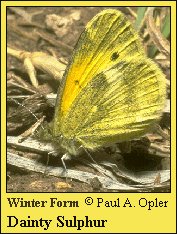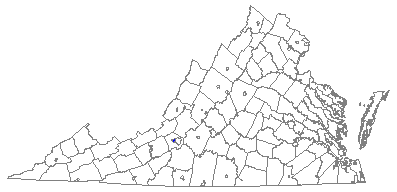 |
 

 |



Dainty Sulphur (Nathalis iole [Boisduval])
Wing span: 3/4 - 1 1/4 inches (2 - 3.2 cm).
Identification: Small, with elongated forewings. Upperside yellow with black markings, female with more extensive black than male. White form very rare. Underside of forewing with orange or yellow patch at base of wing and black spots at outer wing edge. Winter form has dusty green hindwing, summer form hindwing is pale yellow.
Life history: Males patrol a few inches above the ground in low areas for females. Females lay eggs singly on leaves of host plant seedlings. Adults rest with wings closed and held perpendicular to the sun's rays to warm themselves.
Flight: Throughout the year in peninsular Florida and South Texas. After overwintering as adults in the South, some migrate north in spring and summer. Flight of about 6 months in the north.
Caterpillar hosts: Low-growing plants in the aster family (Asteraceae) especially shepherd's needle (Bidens pilosa), sneezeweed (Helenium), fetid marigold (Dyssodia), and cultivated marigold (Tagetes).
Adult food: Nectars at Labrador tea, asters, wild marigold, rabbitbrush, and others.
Habitat: Open, dry places including coastal flats, weedy fields, grasslands, road edges, meadows, and hillsides.
Range: Resident in Guatemala north to peninsular Florida and the Southwest. Cannot survive cold winters, therefore every summer re-colonizes through the Great Plains to southeast Washington, southeast Idaho, Wyoming, and Minnesota.
Conservation: Not usually required.
Management needs: None reported.
The Nature Conservancy Global Rank: G5 - Demonstrably secure globally, though it may be quite rare in parts of its range, especially at the periphery.
References:
Opler, P. A. and G. O. Krizek. 1984. Butterflies east of the Great Plains.
Johns Hopkins University Press, Baltimore. 294 pages, 54 color plates.
Opler, P. A. and V. Malikul. 1992. A field guide to eastern butterflies.
Peterson field guide #4. Houghton-Mifflin Co., Boston. 396 pages,
48 color plates.
Scott, J. A. 1986. The butterflies of North America. Stanford University
Press, Stanford, Calif. 583 pages, 64 color plates.
Tilden, J. W. 1986. A field guide to western butterflies. Houghton-Mifflin
Co., Boston, Mass. 370 pages, 23 color plates.
Author: Jane M. Struttmann
State and Regional References:
Glassberg, J. 1993. Butterflies Through Binoculars: A Field Guide to
Butterflies in the Boston-New York-Washington Region. Oxford Univ. Press,
New York, N.Y. 160 pp.
Clark, A.H. and Clark, L.F. 1951. The Butterflies of Virginia. Smithsonian
Miscellaneous collection No. 116:1-239.
Layberry, R.A., Hall, P.W. & Lafontaine, D.J., 1998. The Butterflies of
Canada. University of Toronto Press, Toronto, ON. 280 pp.
Opler, P.A. 1998. A field guide to eastern butterflies, revised format.
Houghton Mifflin Co., Boston.
Woodbury, E.N. 1994. Butterflies of Delmarva. Delaware Nature Society, Inc.,
Tidewater Publishers, Centreville, MD. 138 pp. [NOTE: this book only
treats True Butterflies (Papilionoidea). It does not treat Skippers
(Hesperioidea).]

